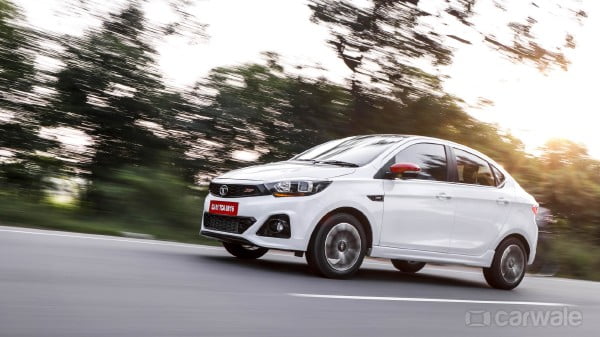
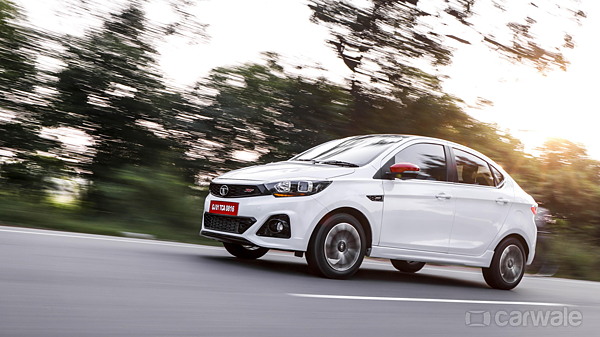
This is the Tigor JTP. It is a look-better, go-faster version of the regular Tata Tigor. And, according to Tata Motors, if this – and its hatchback sibling, the Tiago JTP – manage to garner even five per cent of the volume of the regular versions, JTP will be slapped on other Tata cars as well. Possibly even the likes of the Nexon and the upcoming Tata Harrier.
In This Content
So, what’s different?
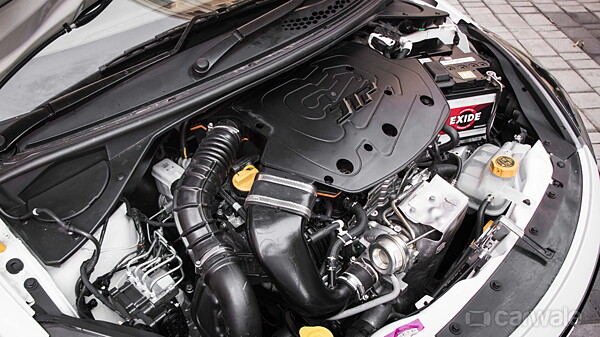
Quite a bit actually. But first, the similarity. The shell, the construction, the panels, the vendor base, and the production line is all identical to the Tigor. But, instead of the naturally aspirated 1.2-litre petrol engine, the Tigor JTP gets the turbocharged version of the same engine.
And that’s not all. With change in boost pressure, throttle and engine mapping, the engine under the JTP hood makes 112bhp compared to 84bhp of the regular Tigor. The peak torque, meanwhile, has gone up to 150Nm. And, it’s flatter too. The JTP continues to use the same gearbox as the regular Tigor, albeit with a shorter final drive, and different gear ratios.
The suspension has been worked upon as well. It is stiffer and marginally lower than the regular car. The steering too has been recaliberated. And, the JTP runs on bigger, wider wheels with tyres that have slightly stiffer sidewalls.
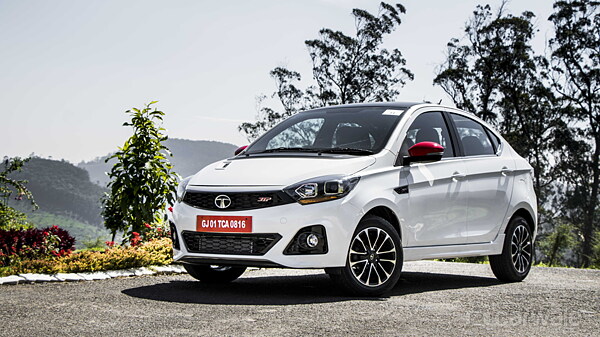
There are some styling tweaks as well. For starters, the Tigor JTP can only be had in White or Red paint hues. We prefer the white. It gets a contrasting black roof, red ORVMs, clear lens tail lamps, and a gloss black strip that runs between the tail lamps. And yes, there’s an overload of JTP bagding as well – grille, side vents, boot lid, you name it, and it’s there.
Inside, everything remains the same as the Tigor XZ. So, there’s a multifunctional steering wheel, climate control, a trip computer, a touchscreen multimedia system, electric adjust for ORVMs, and power windows all round. The JTP also comes with dual front air bags and ABS as standard, like the XZ.
The accents inside though are sportier. The aircon vents have a red outline; one gets faux drilled pedals; leather wrap for the steering; and a black seat with red stitching and a honeycomb motif in the centre.
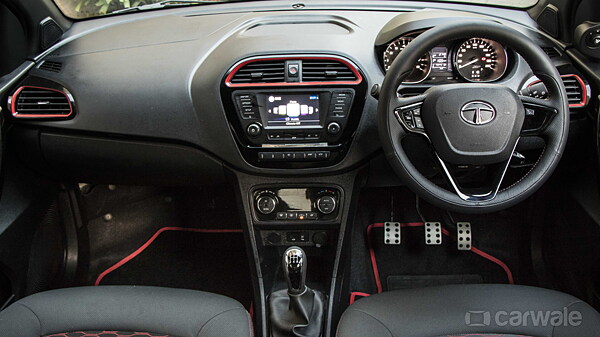
But, does it drive any different?
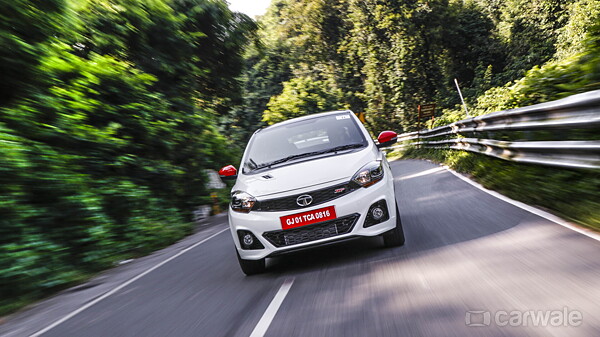
The proof of the pudding is in eating it. Tata and Jayem, the two companies who have co-developed this car, seem to agree. So, the focus wasn’t just on making the Tigor look more desirable in JTP clothing, but to make it desirable for the driving enthusiast as well.
Now, as we mentioned earlier, the engine is from the Nexon, but with even more power. The company has claimed a 0-100kmph time of 10 seconds, which puts it in the same league as the Baleno RS and faster than the Polo GT TSI. Also, this makes the JTP six seconds quicker than the standard Tigor petrol! We haven’t tested the JTP ourselves yet, but, after having driven it, the 10 second figure feels completely believable. It does feel quick, the Tigor JTP.
Now, the JTP has two driving modes – City and Sport. In City, the Tigor JTP feels more alive than the regular car, then be it the mid or top range pull or the throttle response. But, switch to Sport, and it turns into a completely different car! Especially in the way it pulls from 3,000rpm almost all the way to its near 6,000rpm redline. It pleasantly surprises you. It makes you smile. And it makes you want the car.
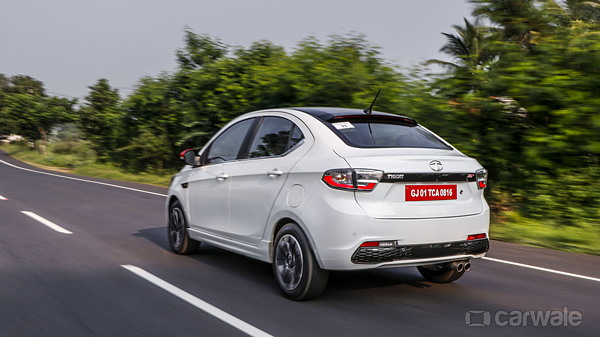
The engine revs freely. The turbo lag doesn’t feel so much like lag. In fact, it’s more like a step up switch. A step up in performance that is. The gear shifts are light, precise, and the throws are short. And though there’s a hint of delay in the car’s response when you stamp on the throttle, once on, the throttle response is crisp and easy to modulate. Having said that, we did find it a bit jerky at times, especially at higher revs in a lower gear.
Back to the performance, and the Tigor JTP accelerates – be it from a standstill or under roll-on – with the vigour one can comfortably associate with a 100bhp plus car. In fact, the Tigor JTP gets deep into three digit speeds with ease. And sits there without effort as well. It feels planted, confident, and unwavering in a straight line, even at these high speeds. If there’s one thing it needs though, it is better feel at the brake pedal, and a stronger brake bite.
Now, we didn’t subject the JTP to hard cornering around a switchback, but we did go around fast, sweeping corners. We also made some quick lane change manouvres. And on both occasions, it was evident that the change in geometry resulting from altered suspension setup, has made the Tigor’s front end a quicker responding one in JTP guise. It’s still not a go-kart, but it makes the Tigor feel lighter, more responsive, and involving than the stock car.
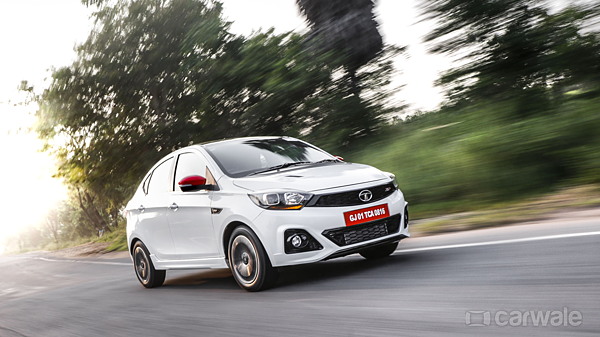
The ride on the other hand is stiffer than the regular car, and the travel is marginally less as well. Not surprisingly, at slow speeds the car rides the bumps instead of flattening them. But, unless you hit a square-edged pothole, the ride never feels harsh. Then, at higher speeds – anything over 60-70kmph – the suspension comes into its own.
Be it undulating roads, pockmarked surfaces, or ruts and rumblers, the Tigor JTP simply glides over it all. And, it never really wallows, weaves, or washes out, no matter how unexpected or pronounced the bump or dip. But, it’s the car’s ability to come back to its steady state in lightning quick time instead of pogoing on its springs, that makes it special. Not, only does this add to the driver’s confidence, it aids both comfort and safety. The latter comes to the fore when one has to make an evasive manoeuvre.
As far as steering goes, only the EPS has been recaliberated for weight. It’s still a three turns lock-to-lock steering, so it isn’t the quickest in the business. But, it proved to be effortless to twirl around in the city, and it weighed up enough at speed to cut out the twitchness. But, like the regular Tigor, this one doesn’t brim with feel either.
Our take
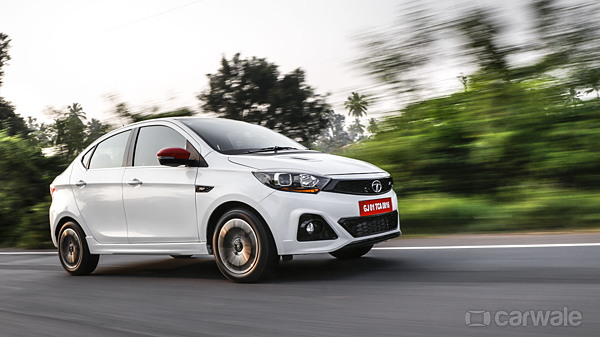
The philosophy behind cars carrying the JTP badging is simple. These will, for the time being, be based on existing Tata Motors models. And, to carry the JTP badge, these cars must have improved engine performance, sportier exterior and interior, and better driving dynamics and sound, compared to the stock car.
On that front the Tigor JTP hits the nail on the head. Okay, it could sound better. It could also do with more refinement. Maybe, the throttle response could be more linear. And lower, more snug seats would be welcome too. But, when it comes to balancing ride and handling, or usability and driving fun, the Tigor JTP is spot on.
Yes, the real hardcore driving enthusiast would like even more performance, even crisper handling, a much lower ride height, and not to mention louder acoustics. But, the current JTP setup makes the Tigor acceptable, agreeable, and even desirable to not just the young and hardcore, but even to guys like me who are married, have kids, and can only afford one car, but don’t want to be stuck with a boring everyday family car.
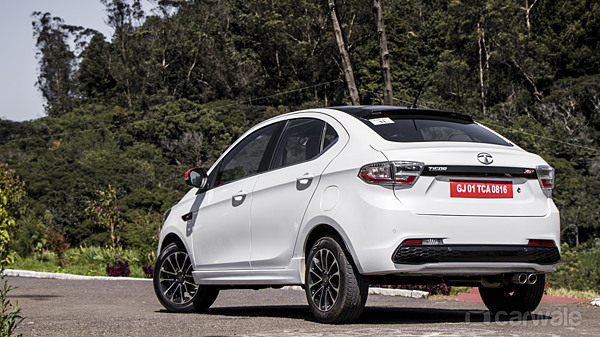
Pictures by Kaustubh Gandhi
[“source=cnbc”]
